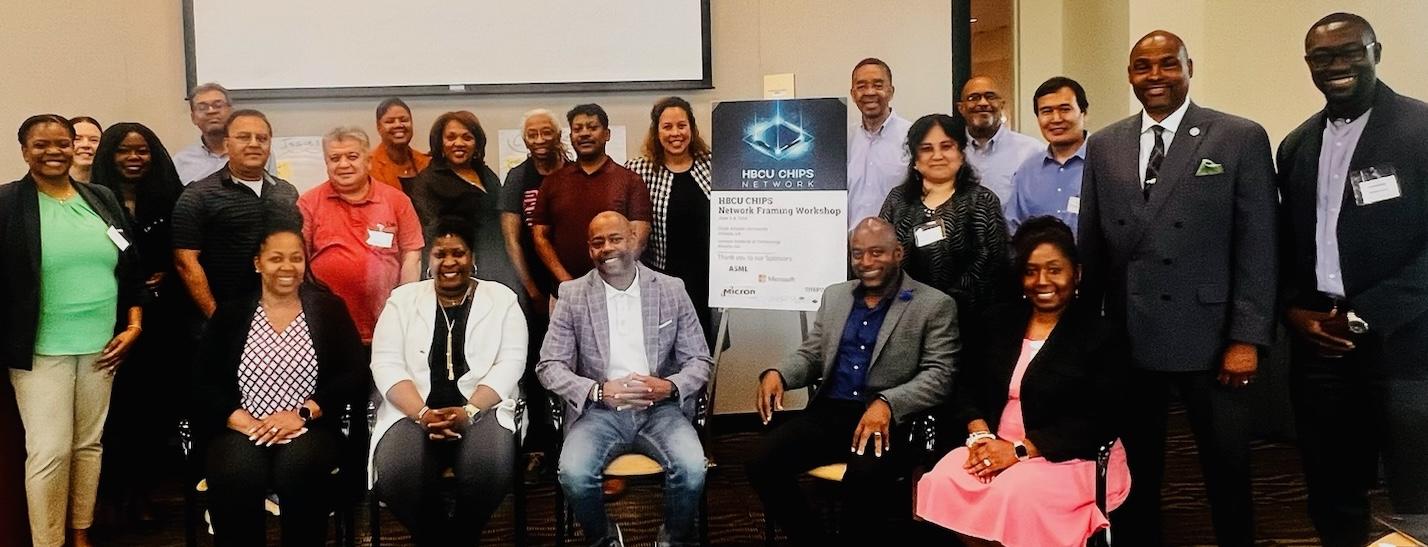HBCU CHIPS Network Defines Organization's Strategic Direction at Atlanta Meeting
Jul 14, 2024 —

The consortium of historically Black educational institutions and other stakeholders convened to establish the organization’s strategic direction and governance model. The goal is to foster a diverse workforce and drive innovation in the U.S. semiconductor industry.
In the heart of Atlanta, members of the HBCU CHIPS Network gathered for a pivotal meeting on June 3-4, 2024. Taking place at Georgia Institute of Technology’s campus, 30-plus representatives from historically Black colleges and universities (HBCUs), historically Black community colleges (HBCCs), nonprofit organizations, and the Institute convened to chart a new course for the microelectronics industry.
At the event, co-hosted by Clark Atlanta University (CAU) and Georgia Tech, attendees worked to establish a strategic direction for the HBCU CHIPS Network, as well as a formal operational and governance model — with the principal goals of enhancing research collaboration, positioning for CHIPS Act funding, and empowering a diverse, inclusive workforce that can meet the needs of the growing U.S. semiconductor sector.
Dietra Trent, executive director for the White House Initiative on HBCUs, attended the first day’s sessions. Frances Williams, vice president for Research and Sponsored Programs at CAU and one of the organizers and co-leaders of the HBCU CHIPS Network, welcomed the attendees and outlined the meeting agenda.
Over two days of discussion, facilitated by Michael Wilkinson, the founder of Leadership Strategies, members reframed the Network’s vision as follows: “The HBCU CHIPS Network is envisioned as a research and education consortium that serves as the nexus of collaboration and cooperation between HBCUs, government agencies, academia, and industry … Through a multidisciplinary approach, the Network will facilitate fulfilling talent pipelines to grow the workforce of the future, research innovations, resolving longstanding disparities in facilities, building out domestic capacity, and providing shared accessibility across the Network stakeholders.”
The group also established the Network’s governance and operational model, including its leadership and organizational structure.
According to George White, senior director for Strategic Partnerships at Georgia Tech and an HBCU graduate, “The outcome from this workshop has the potential to transform HBCU research collaboration and innovation well beyond the CHIPS Act. Additionally, the Network will provide outreach to community colleges, veterans, and k-12 students, empowering a diverse and inclusive workforce that leverages research innovations, including experiential learning opportunities across all stakeholder groups.”
Nationally, the network comprises five regions: the Southeast, the mid-Atlantic and South Atlantic, the Midwest, and the Southwest. Each region will have representation commensurate with their competencies and capacities in microelectronics. Selected board members within each region will constitute the leadership structure. The Network will have affiliate members that include nonprofit organizations and academic institutions like Georgia Tech.
Further, the Network identified several committees and working groups, including technical advisory, education and workforce, innovation and entrepreneurship, contracting, facilities access, communication and tech transfer, and assessment and evaluation. These committees will meet regularly and communicate status and outcomes to the larger Network.
The Network plans to host an annual conference highlighting research from participating HBCUs/HBCCs and industry partners, and the event will include a student-focused career fair.
The HBCU CHIPS Network thanks ASML, Micron, Microsoft, and Synopsys for their sponsorship.
Taiesha Smith, Sr. Program Manager, HBCU-MSI Research Partnerships
taiesha.smith@gatech.edu





